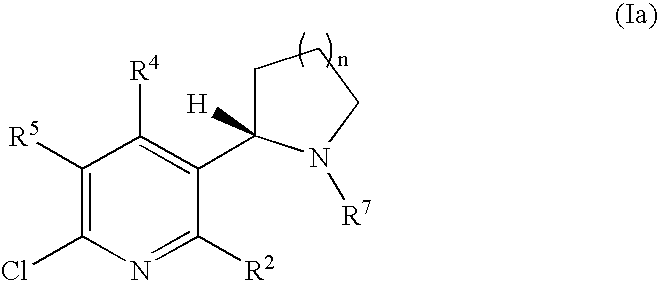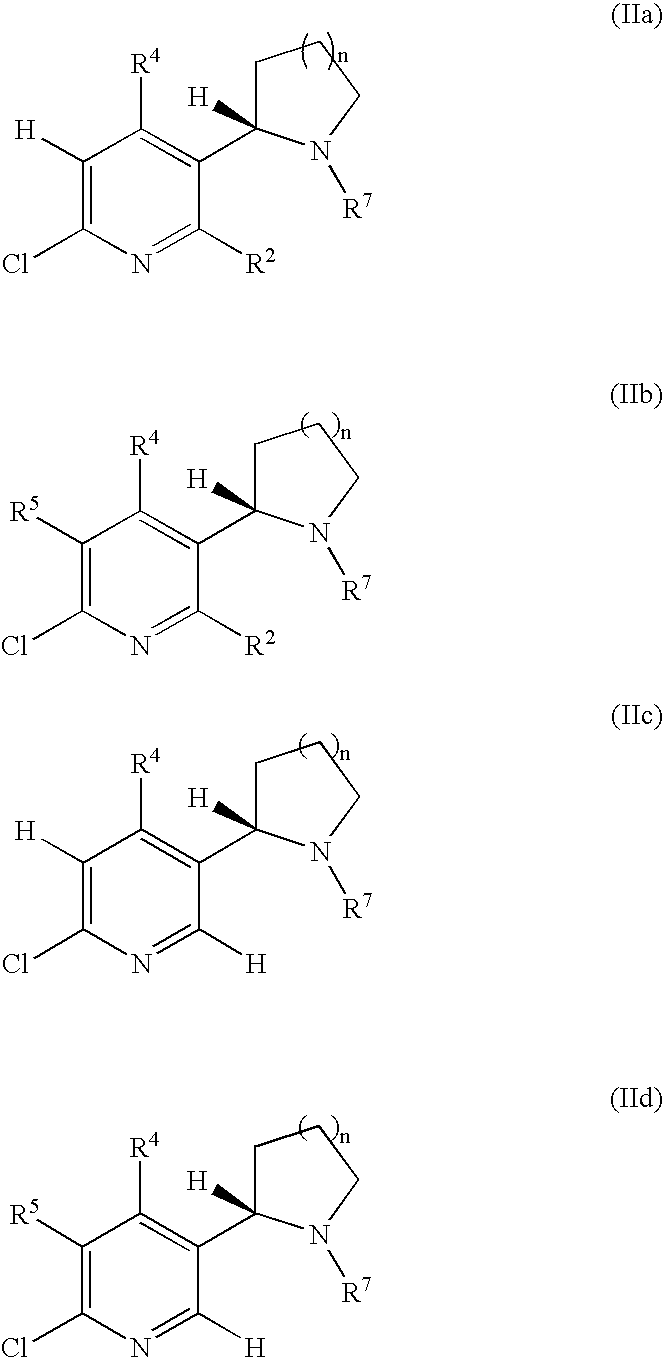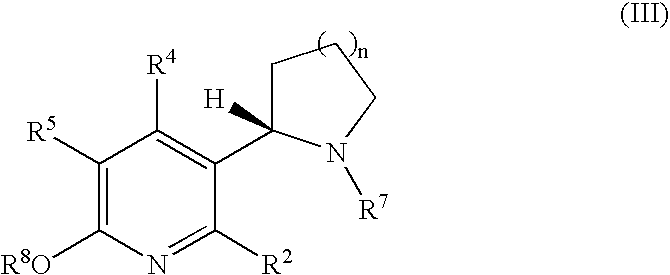Synthesis and regioselective substitution of 6-halo-and 6-alkoxy nicotine derivatives
a technology of regioselective substitution and nicotine derivative, which is applied in the direction of heterocyclic compound active ingredients, biocide, drug compositions, etc., can solve the problems of difficult synthesizing of nicotine analogs, and achieve the effects of reducing the desire or craving of the subject, and facilitating cessation of smoking
- Summary
- Abstract
- Description
- Claims
- Application Information
AI Technical Summary
Benefits of technology
Problems solved by technology
Method used
Image
Examples
examples 1-5
Regioselective Substitution of (S)-6-Chloronicotine
[0212]
example 1
(S)-5,6-Dichloronicotine (II)
[0213]A solution of 2,2,6,6-tetramethylpiperidine (2.96 mmol, 500 μL, 1.1 equiv) in dry THF (3.0 mL) was treated with n-butyllithium (1.1 equiv) at −78° C. After 1 h at −78° C., (S)-6-chloronicotine (2.69 mmol, 530 mg, 1.0 equiv) was added dropwise. After 1 h at −78° C., a solution of hexachloroethane (3.23 mmol, 770 mg, 1.2 equiv) in dry THF (3.0 mL) was added to the mixture at −78° C. After 1 h at −78° C., the reaction was quenched with 3.0 mL of a saturated aqueous solution of sodium bicarbonate. The aqueous layer was extracted with methylene chloride (2×15 mL). The combined organic layers were dried over potassium carbonate. The solvent was removed by evaporation under reduced pressure to afford a light yellow oil. The product was purified by radial PLC (1% TEA / 20% EtOAc / hexanes) to afford 542 mg (87% yield) of a light yellow oil: [α]24D −134 (c 0.8, CH2Cl2); IR (neat) 2968, 2781, 1547, 1420, 1392, 1329, 1149, 1042 cm−1; 1H NMR (300 MHz, CDCl3) 8.20 ...
example 2
(S)-6-Chloro-4-iodonicotine (III)
[0214](S)-6-Chloronicotine (200 mg, 1.02 mmol, 1.0 eq) was added to a solution of n-butyllithium (1.22 mmol, 1.2 eq) in THF (3 mL) at −78° C. After one hour, a solution of iodine (310 mg, 1.22 mmol, 1.2 eq) in THF (stored over 4 Å molecular sieves for 30 min) was added to the mixture. After 5 min at −78° C., the reaction was quenched with a saturated solution of sodium bicarbonate, and the mixture was warmed to room temperature. The mixture was extracted with methylene chloride (2×10 mL). The combined organic extracts were dried over sodium sulfate and filtered. The solvents were removed by evaporation and the product purified by radial PLC (1% TEA / 20% EtOAc / hexanes) to afford 198 mg (60%) of product as white crystals, mp 100-101° C.: [α]27D −141 (c 3.45, CH2Cl2); IR (CDCl3) 2961, 2936, 2804, 1553, 1531, 1438, 1361, 1111, 827 cm−1; 1H NMR (400 MHz, CDCl3) δ 8.37 (s, 1H), 7.74 (s, 1H), 3.34 (t, J=8.4 Hz, 1H), 3.24 (dt, J=8.2 Hz, J=2.0 Hz, 1H), 2.44-2....
PUM
| Property | Measurement | Unit |
|---|---|---|
| temperatures | aaaaa | aaaaa |
| pH | aaaaa | aaaaa |
| temperature | aaaaa | aaaaa |
Abstract
Description
Claims
Application Information
 Login to View More
Login to View More - R&D
- Intellectual Property
- Life Sciences
- Materials
- Tech Scout
- Unparalleled Data Quality
- Higher Quality Content
- 60% Fewer Hallucinations
Browse by: Latest US Patents, China's latest patents, Technical Efficacy Thesaurus, Application Domain, Technology Topic, Popular Technical Reports.
© 2025 PatSnap. All rights reserved.Legal|Privacy policy|Modern Slavery Act Transparency Statement|Sitemap|About US| Contact US: help@patsnap.com



